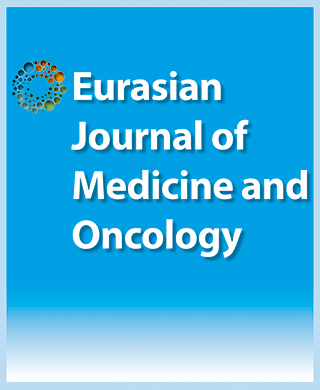

Evaluation of the Relationship between Antioxidant Gene Polymorphisms (Endothelial Nitric Oxide Synthase, Myeloperoxidase, Uncoupling Protein 2) and Breast Cancer
Dilek Erdem1, Meral Gunaldi2, Nilgun Isiksacan3, Irem Karaman4, Mustafa Pehlivan5, Sacide Pehlivan61Department of Internal Medicine, Division of Medical Oncology, Bahcesehir University Faculty of Medicine, Istanbul, Turkey, 2Department of Medical Oncology, Istanbul Aydin University, VM Medical Park Florya Hospital, Istanbul, Turkey Department of Medical Oncology, Istanbul Aydin University, VM Medical Park Florya Hospital, Istanbul, Turkey Department of Medical Oncology, Istanbul Aydin University, VM Medical Park Florya Hospital, Istanbul, Turkey, 3Department of Biochemistry, Health Sciences University, Bakirkoy Dr. Sadi Konuk Training and Research Hospital, Istanbul, Turkey Department of Biochemistry, Health Sciences University, Bakirkoy Dr. Sadi Konuk Training and Research Hospital, Istanbul, Turkey, 4Bahcesehir University Faculty of Medicine, Istanbul, Turkey, 5Department of Hematology, Gaziantep University Faculty of Medicine, Gaziantep, Turkey, 6Department of Medical Biology and Genetics, Istanbul University Faculty of Medicine, Istanbul, Turkey,
Objectives: This study aimed to determine the relationship of breast cancer development with the polymorphisms of endothelial nitric oxide synthase (eNOS), myeloperoxidase (MPO), and uncoupling protein 2 (UCP2) genes. Methods: The study included 60 breast cancer patients and 70 healthy controls. After the exclusion criteria, 37 patients and 70 healthy controls were enrolled in the study. The functional variants examined were the intron-4 variable number of tandem repeats (VNTR), -G463A, and -866G/A variants for the eNOS, MPO, and UCP-2 genes, respectively. The polymerase chain reaction (PCR) and/or PCR-restriction fragment length polymorphism (RFLP) methods were used for genotyping. The distribution of genotype frequencies of the eNOS, MPO, and UCP2 genes between the breast cancer patients and healthy controls was compared using the Chi-square test. Results: The BB genotype of the eNOS gene variant (intron-4 VNTR) was associated with a significantly decreased breast cancer risk (OR=0.56; 95%CI, 0.4630.676; p=0.001); the AA and AB genotypes were not associated with the risk of breast cancer as reported in our previous work. No significant association was determined between the breast cancer risk and any genotype of the MPO gene variant. While the AA (OR=8.167; 95% CI, 2.78523.951; p=0.001) and AG (OR=4.341; 95% CI, 1.67911.222; p=0.002) genotypes of the UCP2 gene variant were associated with a significantly decreased breast cancer risk, GG genotype of the UCP2 gene variant was associated with a significantly increased risk (OR=5.0; 95% CI, 2.20711.327; p=0.001). Conclusion: The Outcomes of this study revealed that breast cancer was associated with BB genotype of the intron- 4 VNTR variant of the eNOS gene and AA, AG, and GG genotypes of the -866G/A variant of the UCP2.
Cite This Article
Erdem D, Gunaldi M, Isiksacan N, Karaman I, Pehlivan M, Pehlivan S. Evaluation of the Relationship between Antioxidant Gene Polymorphisms (Endothelial Nitric Oxide Synthase, Myeloperoxidase, Uncoupling Protein 2) and Breast Cancer. EJMO. 2020; 4(4): 286-291
Corresponding Author: Dilek Erdem



